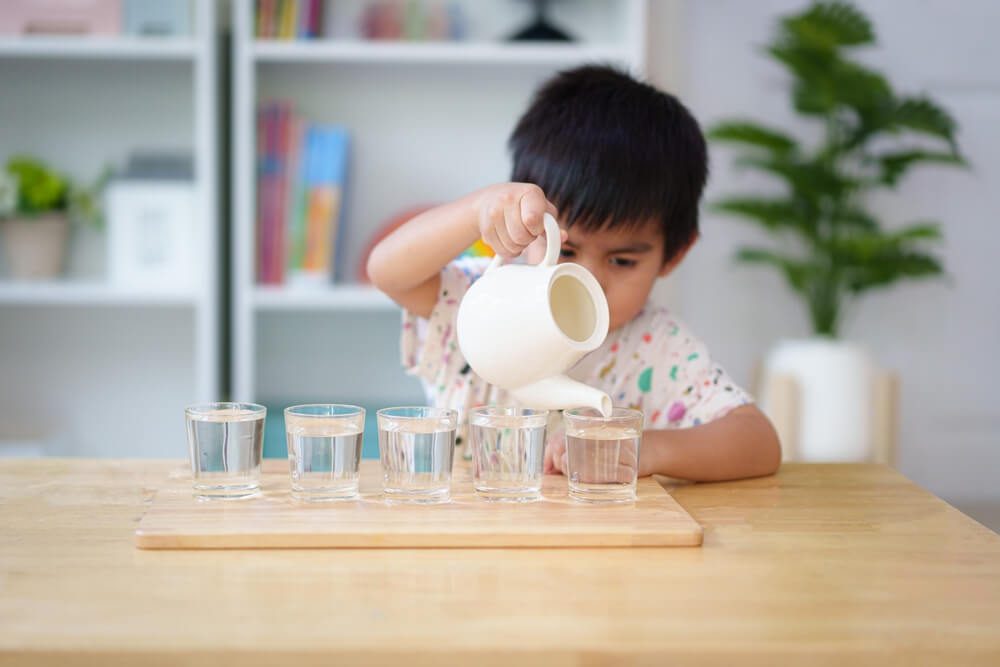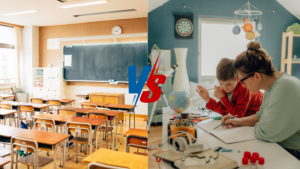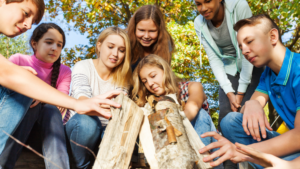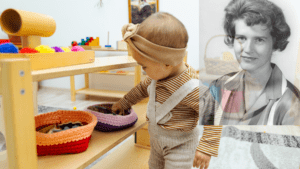Introduction
Montessori education is all about developing practical life skills that help children in their daily lives. These skills are essential for a child’s cognitive, physical, and emotional development. In our previous blog article, we learned about what are Montessori Practical life activities, their purpose, and their benefits. In a nutshell, practical life activities are those activities that help children learn basic life skills such as cleaning, cooking, and dressing themselves. In this blog article, we will discuss 20 such activities that parents can set up at home to help their children to enhance their life skills.
Setting up a Montessori Practical Life at Home: 20 Activities
1. Sweeping
Sweeping is not only a practical way to keep your home clean, but it can also be a fun and educational activity for children. By sweeping, children are able to develop their hand-eye coordination and gross motor skills, which can benefit them in other areas of their lives as well. In addition to providing your child with a small broom and dustpan, you can make sweeping even more exciting by turning it into a game. For example, you can challenge your child to see how many pieces of debris they can pick up in a certain amount of time or have them sweep specific areas of the room in a pattern. Another way to encourage your child to sweep is by incorporating it into their daily routine. For instance, you can make it a part of their chores or ask them to sweep before and after mealtimes. By doing this, not only will your home stay clean, but your child will also be developing important life skills that will benefit them in the future.
2. Pouring
Pouring is not only a fun activity, but it also helps develop important skills in children. For instance, it can enhance their hand-eye coordination and fine motor skills through the act of pouring water from a pitcher into a small glass or cup. Additionally, pouring can also be used to teach children about measurement and estimation. To make this activity even more engaging, you can set up variations such as having the child pour from one glass to another or pouring from a bottle to a glass. This will not only create more opportunities for learning, but also provide a sense of accomplishment for the child as they successfully complete each task.
3. Buttoning
Buttoning is an activity that helps develop fine motor skills and hand-eye coordination. Provide your child with a piece of fabric with buttons and show them how to button and unbutton the buttons. By engaging in this activity, your child will learn how to use their fingers and hands in a more precise way. They learn to dress themselves independently and gain confidence.
4. Folding
Folding is an activity that helps develop fine motor skills and hand-eye coordination. Provide your child with a piece of fabric or paper and show them how to fold it neatly. It can be done using a square piece of fabric or a handkerchief with dotted vertical and horizontal lines. Learning how to fold clothes helps them become independent do their daily chores and gain confidence.
5. Washing Dishes
Washing dishes is an activity that helps develop gross motor skills and hand-eye coordination. Fill a basin with soapy water and provide your child with a sponge and a few dishes to wash. This activity not only helps a child to do daily chores independently, but also helps them learn the importance of cleanliness. It also gives you time to bond with your children.
6. Polishing Shoes
Polishing shoes is a Montessori practical life and care for the environment activity that helps develop fine motor skills and hand-eye coordination. Provide your child with a small brush and shoe polish and show them how to polish a pair of shoes. You can repeat this activity every evening, by allowing them to dress themselves for the school.
7. Watering Plants
Watering plants is an activity that children love. It helps develop gross motor skills and hand-eye coordination. To get started, provide your child with a small watering can and show them how to water the plants. This way, they not only learn how to care for the environment but also build a stronger vocabulary by learning the names of the plants they are watering.
Also Check: How to set up Montessori Environment at Home?
8. Grating
Grating is a food preparation activity that helps develop fine motor skills and hand-eye coordination. Provide your child with a small child-sized grater and a piece of cheese or vegetable to grate. Watch them learn how to grate cheese and develop their hand and eye coordination.
9. Mopping
Mopping is an activity that helps develop gross motor skills and hand-eye coordination. Provide your child with a child-sized mop and bucket of soapy water and show them how to mop the floor. This activity teaches them about cleanliness lessons and helps them take part in doing daily chores.
10. Sewing
Sewing is an activity that helps develop fine motor skills and hand-eye coordination. Provide your child with a piece of fabric and a child-friendly needle and thread, and show them how to sew a simple stitch. Please take care of their safety too.
11. Sorting
Sorting is an activity that helps develop fine motor skills and hand-eye coordination. Provide your child with a set of objects and show them how to sort them by color, size, or shape.
12. Setting the Table
Setting the table is an activity that helps develop gross motor skills and hand-eye coordination. Provide your child with a set of dishes and utensils and show them how to set the table for a meal.
13. Cutting
Cutting is an activity that helps develop fine motor skills and hand-eye coordination. Provide your child with a pair of child-safe scissors and a piece of paper to cut.
14. Ironing
Ironing is an activity that helps develop fine motor skills and hand-eye coordination. Provide your child with a small iron and a piece of fabric to iron.
15. Sweeping Outside
Sweeping outside is an activity that helps develop gross motor skills and hand-eye coordination. Provide your child with a small broom and dustpan and show them how to sweep the patio or porch.
16. Tying
Tying is an activity that helps develop fine motor skills and hand-eye coordination. Provide your child with a shoe with laces and show them how to tie the laces.
17. Baking
Baking is an activity that helps develop gross motor skills and hand-eye coordination. Provide your child with a simple baking recipe and show them how to measure and mix the ingredients.
18. Dusting
Dusting is an activity that helps develop fine motor skills and hand-eye coordination. Provide your child with a feather duster or cloth and show them how to dust surfaces in the home.
19. Planting
Planting is an activity that helps develop gross motor skills and hand-eye coordination. Provide your child with a small pot and soil and show them how to plant a seed.
20. Packing a Backpack
Packing a backpack is an activity that helps develop gross motor skills and hand-eye coordination. Provide your child with a small backpack and show them how to pack it with the items they need for the day.
Conclusion
Montessori practical life activities are an excellent way for children to develop life skills that will help them throughout their lives. By setting up these activities at home, parents can help their children learn and grow in a fun and engaging way. These activities also help children develop a sense of independence and self-confidence, which is essential for their overall well-being. So, try out these activities with your child and watch them flourish!
Do let us know your experience after implementing these easy-to-set-up practical life activities in the comments below.




